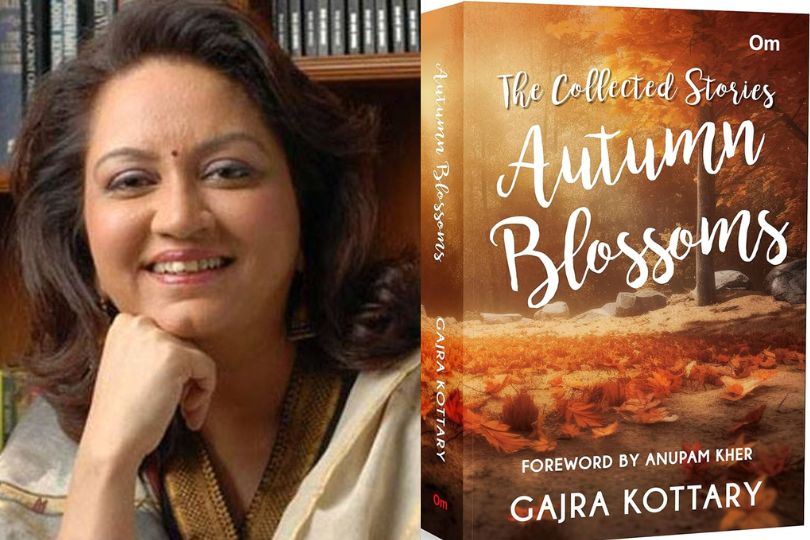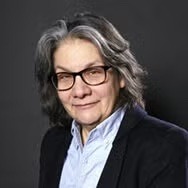Interview with Gajra Kottary, Author “Autumn Blossoms”
Discover the creative journey behind 'Autumn Blossoms' with author Gajra Kottary in an exclusive interview on Frontlist.on Mar 01, 2024

Gajra Kottary debuted as an author in early 1996 with her first collection of short stories. Her debut novel Broken Melodies was published in 2011. Her second novel Once upon a Star was released in December 2014 and the third, Girls Don’t Cry in June 2017. She is an award-winning screenwriter for some of the biggest shows on Indian television, including Astitva, Buddha and Balika Vadhu. Gajra's lifetime collection of 50 women centred short stories has recently been released and is titled Autumn Blossoms.
Frontlist: As an author delving into the complexities of urban women's lives in India, could you share what experiences or observations led you to focus on portraying the challenges and nuances of women's lives in contemporary Indian society?
Gajra: The 50 stories in Autumn Blossoms have been written over a period of 25 years, and many of these have been parts of previous collections. I have always been a very curious and keen observer of women's lives around me. I think most of us just can't escape this observation, except that in my case, more often than not, I would start taking what I observed to the next level of wondering about the "what if..." of the peculiarity of the woman's situation.
In many cases, the stories came out of my few experiences as a journalist or interesting newspaper items that became the trigger for wondering about a woman's situation. For example, there is a story about two very different women who become friends on a train journey together. Or two who discover a bizarre connection with each other while on a work trip. There are tales about wives whose nature gets so sharply defined by the kind of men they are married to and much else. There is no one prototype of an urban woman, beyond the fact that they perhaps are all educated women and have urban trappings. Having said that, there are a few stories of small-town and rural women of contemporary India too.
Frontlist: Your book is divided into three sections: "Yin and Yang," "Reflections in Water," and "The Mirror Doesn't Lie." These titles evoke imagery and symbolism. Could you share why you chose these particular themes to categorize your short stories? What significance do they hold in relation to the narratives and the portrayal of women's experiences?
Gajra: I firmly believe that whether man or woman, we are characterized by our relationships. I also get to indulge this belief system because day in and day out, I write about women's relationships in my television shows that are, by their very nature, women-centered. So, it's become second nature to understand women through their relationships.
When I thought of categorizing the stories for some sort of classification and began to study the patterns, I thought it made sense to have these three sections. Most of the time, it's either their relationships with men or other women that preoccupy and interest women, so those two categories came easily.
It is the third category that I find most interesting, both as a category by itself and, therefore, the stories that I choose to include in that category too are special. For we can delude ourselves in many ways in our relationships with others, but facing ourselves, we can't lie...it's like looking into a mirror. While each section's stories are distinctive to that section, there is significant overlapping too. So maybe a reader might believe that a particular story belongs better to another section rather than where it's been included, and I am good with that debate.
Frontlist: Were your stories often inspired by real-life experiences, and can you share an intriguing anecdote about how a personal encounter or observation influenced the creation of one of your narratives?
Gajra: Oh yes...most of my women are credible, real, relatable women. There is a story in the book called "Waxworks", and the woman in it is someone I encountered on my visit to the salon. The moment she walked in, there were twitters of irritation, and then I noticed a distinct reluctance on the part of the staff to attend to her, followed by the woman throwing a fit about it, as she was willing to pay and felt disrespected....She actually stormed out dramatically soon enough and then I got talking to the staff about her...
What I learned from their account, especially when I read between the lines, was emotionally searing, to say the least, though the staff hadn't quite interpreted it that way. It shaped itself into a very thought-provoking story, dare I say.
Frontlist: Your stories vividly depict urban women facing numerous challenges. In your view, what are the most pressing issues for women in urban India today, as shown in your narratives? Can you share a story or character that highlights the complexity of addressing these issues within contemporary Indian society?
Gajra: I think what comes through in many of the stories is the dilemma of choices that today's women have to make. Balancing or choosing between domesticity and personal identity, many of these stories reflect this conundrum, even though the stories themselves have been written over decades, but that's a forever issue with women. We want it all, but there is always a skew. A skew that creates angst no matter what choice we make...either we compromise on domestic bliss, or we crave fulfilling our distinctive identity and independence, and there is not much respite there over the years.
There is a story named "Friends Indeed" that brings this out most sharply. Two friends who make different choices for life, and over the years, each experiences fulfillment due to chosen choices as well as frustration. And towards middle age, there comes the "what if" angst about what if they had lived life differently. Is it possible to experience the greener grass on the other side now?
Frontlist: Crafting 50 short stories within a single book is undeniably impressive. Amidst such a vast collection, did you ever face writer's block or feel constrained by exploring similar thematic frames repeatedly? If so, how did you overcome these challenges to ensure each story remained distinct and infused with creativity and freshness?
Gajra: Thank you for that acknowledgment, but honestly, it wasn't that difficult. The good thing about writing short stories is that I could complete writing one in a short span of time and then take as long a break as was practically needed before moving on to the next in an unhurried manner and not feel a creative break.
The editing the sifting and revisions all came at a much later stage when the entire collection had been completed. The categorization too happened much later and wrinkles were smoothed easily.
Yes, I did notice at the editing stage that there were recurrent themes that sometimes crept in subconsciously. But it was also heartening to note that the stories thankfully panned out very differently. A case in point is the clash between the urban journalist and a rural woman in "A Cure For All Ills" and "Happily Ever After". It bothered me to note the pattern initially, but I worked on both stories a bit and then found that they were similar yet different. So in the end, it was fine.
Frontlist: Among your 50 short stories, do you have a personal favorite? If so, could you share why it holds a special place in your heart or what makes it stand out from the rest?
Gajra: My all-time favorite in Autumn Blossoms is a story titled "Two Gold Guineas" a story that came to me in one mysteriously restless night at one go. It has three women of different generations and their interpersonal relationships of love and hate all interwoven. At the same time, it actually touches upon each of their relationships with their men, and their journeys within themselves going inwards to self-analyze and grow beyond what they were...In that sense, it is my most complete story.
I loved the world and characters of the short story so much that I had created a full-length novel to expand the story a few years ago. It was a novel titled "Girls Don't Cry" and it's been published by HarperCollins India.
Frontlist: On International Women's Day, what message or reflection do you hope readers take away from your collection of short stories?
Gajra: If it's a one-line takeaway I'd say "Revel in being a woman...embrace yourself, warts et al."

.jpg)
.jpg)
.jpg)
.jpg)
.jpg)
.jpg)

.jpg)

.jpg)
.jpg)

.jpg)
.jpg)
.jpg)










Sorry! No comment found for this post.